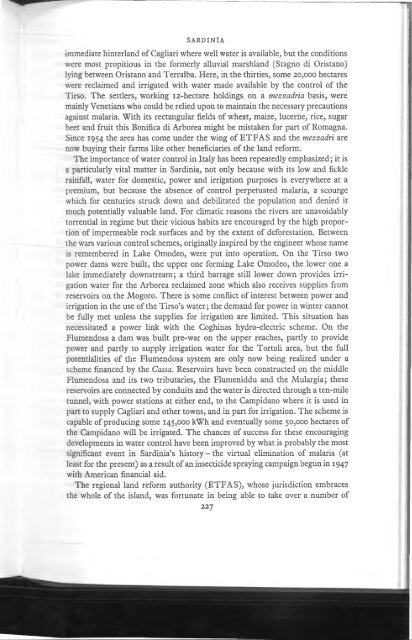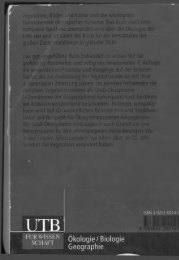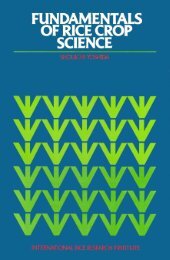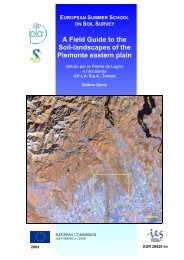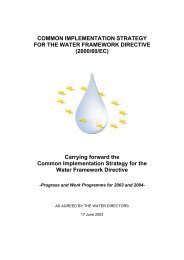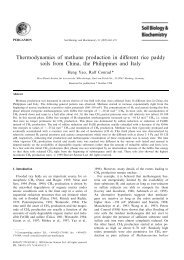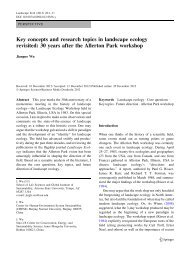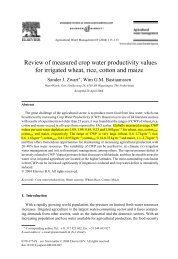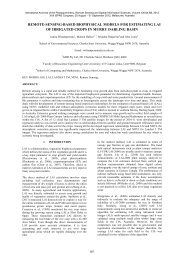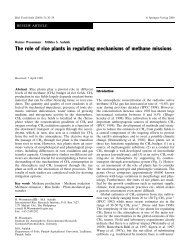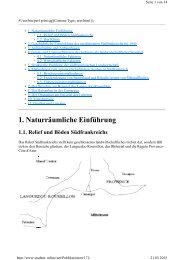Walker - 1967 - A geography of Italy
Walker - 1967 - A geography of Italy
Walker - 1967 - A geography of Italy
Create successful ePaper yourself
Turn your PDF publications into a flip-book with our unique Google optimized e-Paper software.
ii^<br />
I<br />
I<br />
PART iv ; ECONOMIC GEOGRAPHY<br />
administrations whose land reform and reclamation projects are intended to reinforce<br />
the small proprietor class. Unfortunately most small family farms (including<br />
some o f those created under the land reform) are incapable o f providing<br />
an income comparable with those obtainable in modern industry and they will<br />
have difficulty in achieving the efficiency which will be demanded in the near<br />
future. Funds are available at low interest for those who wish to enlarge their<br />
holdings by purchase, and over half a million hectares have been bought in<br />
recent years, but the problem o f fragmentation, which is a serious handicap on<br />
some 20% o f <strong>Italy</strong>’s farmed area, is practically insoluble for three-quarters o f the<br />
area concerned. Co-operation can help in overcoming some o f the small farmer’s<br />
difficulties but except in parts o f the Northern Plain, notably in Emilia, its<br />
development has been slow. Under the fascists co-operatives were banned and<br />
unless sponsored by the government they are still regarded with suspicion in<br />
some quarters.<br />
Not all <strong>Italy</strong>’s small farmers come under the heading o f coltivatori diretti;<br />
about 12% o f the country’s productive area is worked under the system known<br />
as mezzadria appoderata whereby an estate is divided into several compaa<br />
holdings (poderi), usually o f between 5 and 15 hectares, each with its modest<br />
farmstead. The landowner or his agent exercises a general supervision o f the<br />
estate from the home farm (/ationa) and receives ‘rent’ from the mezzadri in kind.<br />
A t one time the crops and the expenses were shared between landlord and<br />
tenant on a 50/50 basis but recently the tenant’s share has been raised by legislation<br />
to 58%. In fact contracts vary according to the contribution o f each party<br />
but in general the landowner pays the taxes while other expenses (seed, fertilixers,<br />
hire o f machinery, etc.) are shared equally. The success o f the system depends<br />
much on the goodwill and enterprise o f the parties concerned. From the point <strong>of</strong><br />
view o f the mezzadro it has its advantages; he is assured o f at least part o f his<br />
capital needs, and since it is usual for the peasant family to remain on the podere<br />
year after year, permanent improvements and sound husbandry are encouraged<br />
to the benefit o f both parties. Mezzadria appoderata is most widespread in<br />
Tuscany, the Marche, Umbria and southern Emilia; it is also represented in<br />
Veneto and the margins o f the Northern Plain, but it is rare in the South. O f late<br />
the system has been attacked as an anachronism in a modem democratic state and<br />
from 1965 onwards no new mezzadria contracts can be legally entered into. When<br />
a podere falls vacant the landowner must either work the land himself with hired<br />
labour if necessary, or he must sell or rent the land to someone who is prepared to<br />
work it ‘directly’. The object o f this legislation seems to be either to convert the<br />
landowner into a direct cultivator or induce him to sell out. The state is prepared<br />
to advance funds at low interest to peasants who wish to purchase land but with<br />
the prevailing uncertainty in agriculture it remains to be seen whether many<br />
buyers will be forthcoming. The effect o f the new legislation may well be that<br />
much land will go out o f cultivation.<br />
Mezzadria appoderata should not be confused with the form o f mezzadria<br />
242


